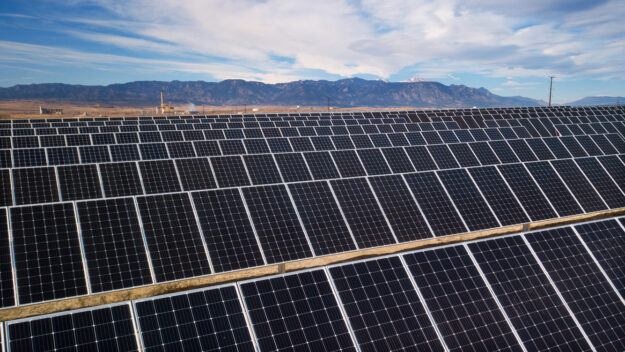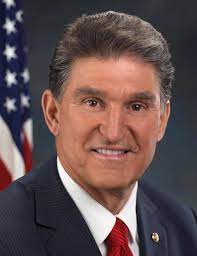Widgetized Section
Go to Admin » Appearance » Widgets » and move Gabfire Widget: Social into that MastheadOverlay zone
Climate provisions in budget deal still face major hurdles in looming U.S. Senate vote this week

Environmental advocates largely praised the climate provisions in Senate Democrats’ massive taxes, health care and energy bill released Wednesday night, saying even with provisions to help the fossil fuel industry, the measure represents a historic step toward addressing the climate crisis.
The 725-page bill — made public mere hours after U.S. Sen. Joe Manchin III and Senate Democratic Leader Chuck Schumer announced a surprise deal — includes $369 billion over 10 years in tax credits and spending for renewable energy.
It also provides incentives for energy producers to decarbonize and would place a fee on methane emissions.
Senate Democrats estimate those provisions would help the country reduce U.S. carbon emissions by 40% by 2030, nearly putting the country on track to meet President Joe Biden’s goal of a 50% reduction in that time frame.
“It’s the breadth of it that’s really so important for climate policy,” Julie McNamara, a deputy climate and energy policy director with the climate advocacy group Union of Concerned Scientists, said in an interview.
“We know that when we’re shifting towards a deeply decarbonized economy, we can’t just look at any one sector. We need to be making progress across the board. And this does that.”
Biden praised the deal on Thursday.
“It will be the most important investment — not hyperbole — the most important investment we’ve ever made in our energy security and developing cost-saving and job-creating clean-energy solutions for the future,” Biden said. “Big deal.”
Tax incentives
The bill would provide tax incentives for energy companies to produce solar, wind, hydrothermal and other renewable energy and for fossil fuel industries to trap climate-warming greenhouse gas emissions before they reach the atmosphere.
Additional tax breaks would be available for placing renewable projects in low-income areas and communities where fossil fuel industries have been major employers.
The measure would also provide consumer subsidies for items like electric vehicles, residential solar panels and electric water heaters.
And the bill would impose the first fee on methane emissions, a major greenhouse gas, and would provide $1.5 billion to the Environmental Protection Agencies to help companies reduce methane.
Compromise but still historic
Resulting from months of negotiation between the coal-friendly Manchin and Democrats who favor more aggressive climate action, the measure is a compromise, several Democrats and climate advocates said.
Though imperfect, the measure should be recognized as a historic, many said.
Former Vice President Al Gore, who has become a climate activist since leaving office in 2001, said on Twitter the measure “has the potential to be a historic turning point.”
“It represents the single largest investment in climate solutions & environmental justice in US history,” the former Democratic senator from Tennessee said.
“No deal is perfect and we need many more actions to solve the climate crisis. Yet, this bill is a long overdue and necessary step to ensure the US takes decisive action on the climate crisis.”
Although Democratic leaders have endorsed the measure, key lawmakers, including moderate U.S. Sen. Kyrsten Sinema of Arizona and progressives in the House, have not signed on — meaning its passage isn’t ensured.
A spokeswoman for Sinema, an Arizona Democrat, said Thursday she is still reviewing the bill and declined to comment.
U.S. House Natural Resources Chairman Raúl Grijalva, an Arizona Democrat aligned with House progressives, was skeptical in his praise, saying he was particularly worried about a pledge to reform federal permitting requirements for new infrastructure.
“I was glad to hear last night’s announcement of a Schumer-Manchin deal — but it was a measured celebration,” he said. “Any compromise is going to have winners and losers, so it’s important that we see all the details before we declare victory.”
Manchin and fossil fuels
To win the crucial support from Manchin the bill also includes concessions to the fossil fuel industry that some environmentalists say would put the country off-track to reach climate goals.
In an interview Thursday with West Virginia news radio host Hoppy Kercheval, Manchin said provisions supporting fossil fuels were critical for him.
Manchin said his staff mainly authored the bill, which he contrasted with progressives’ $6 trillion proposal last year that he said sought to eliminate fossil fuels.
“Everyone came around and understood I wasn’t budging from making sure we have a robust energy portfolio … and it be balanced,” he said. “It’s a hard time getting people to even think that way because they were so aspirational: ‘Get rid of all fossil, get rid of all coal, get rid of all oil, get rid of all gas, get rid of everything.’ Yeah and we’ll go to hell in a handbasket.”

He told Kercheval he was “totally alarmed” by the Biden administration looking to other countries for oil and Russian President Vladimir Putin’s attempts to weaponize that country’s supplies, he said.
The U.S. needed to counter that with a more robust energy supply, he said. The bill is “well-balanced” and recognizes the role of oil, gas and coal while also investing in renewable sources, he said.
The bill would mandate that the Interior Department could not offer federal lands for wind and solar development without also offering substantial oil and gas lease sales on federal lands.
Another provision would require new off-shore leasing in Alaska and the Gulf of Mexico.
“Sen. Manchin wanted certain things in the bill that the vast majority of our caucus didn’t want,” Schumer said. “But we had a north star: 40% reduction in carbon … Getting to 40 was a remarkable achievement, and that includes the things we didn’t like that Manchin put in the bill.”
Schumer called the bill “the greatest pro-climate legislation” that Congress has ever considered and said it marked “a turning point in our fight against climate change.”
Manchin’s support is crucial in the 50-50 Senate. Democrats plan to use the budget reconciliation process to avoid the chamber’s normal 60-vote requirement.
All Republicans are expected to oppose the legislation.
“Democrats have outlined a giant package of huge new job-killing tax hikes, Green New Deal craziness that will kill American energy, and prescription drug socialism that will leave us with fewer new life-saving medicines,” Senate Republican Leader Mitch McConnell said in a Thursday statement.
Some reservations
But Manchin’s support comes at a cost for the climate, Erik Schlenker-Goodrich, the executive director of the environmental group Western Environmental Law Center, said.
Schlenker-Goodrich praised the measure as “a massive investment in clean energy” that would reduce energy costs for consumers. But, he said, the bill does not do enough to move away from fossil fuels.
Scientific literature suggests that new oil and gas development needed to have ended “a year or two ago” in order to keep global warming below the 1.5 to 2 degrees Celsius threshold to avoid the most catastrophic effects of climate change. New oil and gas development “could render those targets unattainable,” he said.
“So if a bill is promoting and requiring new oil and gas leases — in other words, the development of new oil and gas fields — yes, with one hand you are giving in terms of climate action with all the clean energy investments, but with the other hand you’re making our ability to safeguard the climate that much more difficult,” he said.
The fossil fuel elements don’t negate the “overarching strength of the bill,” he said, but they add “problematic elements.”
Permitting process
Schumer also agreed to Manchin’s demand for separate legislation to reform the federal permitting process.
Manchin said Thursday that commitment was airtight.
“Without permitting reforms, without the ability for America to do what it does best — produce — there is no bill,” Manchin said. “And that is totally agreed upon and understood.”
Schumer told reporters he, Manchin, House Speaker Nancy Pelosi and Biden agreed on a permitting provision. That provision hasn’t been released publicly and it’s unclear exactly what federal permits it would affect.
The Democratic leader said he partially agreed on the need for permitting reform. Delays in permitting can also slow down clean-energy projects, he said. Schumer said he would try to get the permitting provision in a continuing resolution that must pass before Oct. 1 to keep the government funded.
That promise worried Grijalva, the former leader of the Congressional Progressive Caucus.
Permitting reform, he said in a statement, could be a “euphemism for gutting our most foundational environmental and public health laws.”
“There’s no question that the urgency of the climate crisis requires quick action,” he said. “But it would be counterproductive to permanently put the very laws that protect us and our planet at risk to do that.”
U.S. Sen. Jeff Merkley, an Oregon Democrat who is aggressive on climate change, also tweeted he was skeptical of the permitting changes.
“$300B for clean energy investments seems like a very positive step — but details matter,” he wrote Wednesday night. “I’m especially concerned that the permitting package doesn’t turn around and undermine the carbon savings of these investments.”
Schumer said he’d spoken with the current leader of the Congressional Progressive Caucus, Washington Democrat Pramila Jayapal, who was “very laudatory” of the bill.
The Senate will vote on the bill this week, Schumer said Thursday.
Editor’s note: Jennifer Shutt contributed to this report. This story first appeared on Colorado Newsline, which is part of States Newsroom, a network of news bureaus supported by grants and a coalition of donors as a 501c(3) public charity. Colorado Newsline maintains editorial independence. Contact Editor Quentin Young for questions: info@coloradonewsline.com. Follow Colorado Newsline on Facebook and Twitter.


